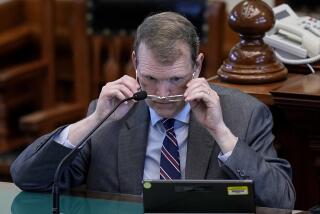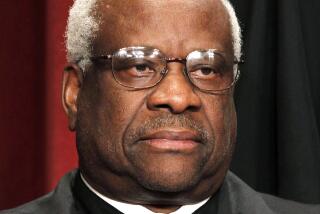Fundraiser in deep in Edwards affair
- Share via
WASHINGTON — New questions emerged Friday about John Edwards’ longtime chief fundraiser and secret efforts that protected the pregnant woman with whom the former presidential candidate has admitted an extramarital affair in 2006.
Fred Baron, Edwards’ national finance chairman and a wealthy Dallas-based trial attorney, has acknowledged that he quietly began sending money to Rielle Hunter, Edwards’ mistress, to resettle in California, along with the family of Andrew Young. Young is the campaign aide who has said he is the father of Hunter’s daughter, born after her affair with Edwards.
But Baron is far more intertwined in the matter than previously known, with long-standing personal connections to the lawyers who represented Hunter and Young, according to a review of legal findings by the Associated Press. Hunter’s lawyer, Robert J. Gordon of New York, was sued unsuccessfully with Baron and Baron’s law firm in 2001 in U.S. District Court in New York in a racketeering complaint. Young’s lawyer, Pamela J. Marple of Washington, was among three lawyers who defended Baron and his firm. The case was dismissed in December 2005.
Baron didn’t return a phone call or respond to an e-mail from the AP on Friday.
The relationships among Baron, Marple and Gordon were first reported in Friday’s editions of the New York Times. The newspaper said Baron acknowledged he might have played a role in hiring Marple and Gordon in the Edwards scandal, after initially saying he did not know how the lawyers were chosen.
Meanwhile, an earlier payment of $14,000 to Edwards’ mistress from the candidate’s political action committee was exchanged for 100 hours of unused videotape she shot producing short Web movies for which she already had been paid $100,000, an Edwards associate told the AP. Neither Edwards’ advisors nor this associate would discuss the purpose of the payment on the record.
That payment from Edwards’ OneAmerica political action committee, which came after Hunter stopped working for it, came in April 2007, months before Baron quietly began sending money himself to Hunter. Baron has described his payments to Hunter as a private transaction.
Edwards acknowledged last week that he had an affair with Hunter in 2006. The former Democratic presidential contender and senator from North Carolina has denied any knowledge of payments from Baron to Hunter.
Baron’s payments could present legal problems, said Washington attorney Cleta Mitchell, who specializes in campaign finance law and who represents Republican candidates and conservative groups. She said all payments to anyone involved in Edwards’ presidential campaigns -- including Hunter and Young -- should have been fully disclosed under U.S. campaign finance laws.
“That would undermine the purpose of the payments, which was to avoid public disclosure of the affair,” Mitchell said. “The idea that Edwards’ finance chairman can independently hand over substantial sums of money to two campaign workers at a time when Edwards is a candidate and to argue that that is not related to his campaign is a bit preposterous.”
The earlier, $14,000 payment to Hunter is significant because its source was Edwards’ OneAmerica political action committee, whose expenditures are governed by U.S. election laws.
Willfully converting political action committee money to personal use would be a federal criminal violation.
An associate of Edwards, speaking on condition of anonymity, said the $14,000 was paid to Hunter only after she relinquished about 100 hours of cutting-room floor videotape excerpts that were not part of four short Web videos she had produced for Midline Groove Ltd., a company Hunter started with a business partner in 2006.
When Hunter provided the last of more than 100 hours of footage, the firm was paid as contracted for, said the Edwards associate.
Legal experts said it was important for Edwards to demonstrate that the PAC wasn’t paying Hunter merely to keep her quiet about the affair.
“One thing that’s possible is that she was still owed money from what she’d done before for the political action committee, but obviously there are less charitable explanations,” said Richard Hasen, a professor specializing in campaign finance law at Loyola Law School in Los Angeles.
Edwards, who made millions as a personal injury lawyer, has relied heavily on fellow lawyers to finance his political career.
And no single law firm has been more generous than Baron’s. Through Edwards’ election to the Senate from North Carolina and his 2004 presidential bid, the Dallas firm had donated $419,650 to help Edwards win elections, according to the Center for Public Integrity.
Baron, a former president of the main national trade association for trial lawyers and a longtime Democratic donor and fundraiser, also was Edwards’ finance chairman in his 2004 and 2008 campaigns for the presidential nomination.
More to Read
Get the L.A. Times Politics newsletter
Deeply reported insights into legislation, politics and policy from Sacramento, Washington and beyond. In your inbox twice per week.
You may occasionally receive promotional content from the Los Angeles Times.










